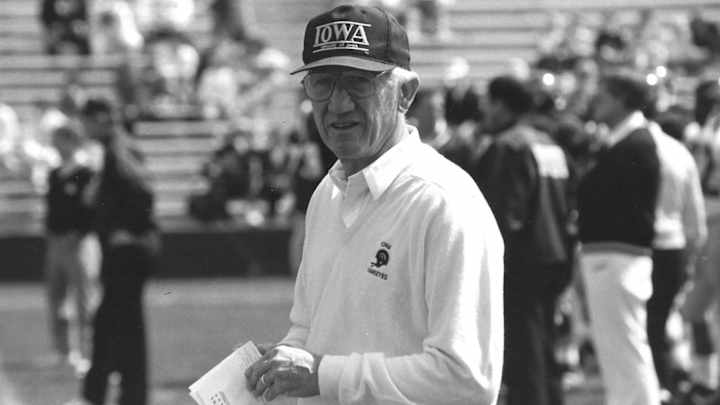Bill Brashier Helped Hayden Fry Rebuild Hawkeyes

In this story:
IOWA CITY, Iowa - Bill Brashier and Hayden Fry were born three months apart in Eastland, Texas, in 1929. They first met as kindergarten classmates, and it was the start of a friendship that would help take Iowa football from futility to the Rose Bowl five decades later.
These were two friends with completely different personalities.
“Bill was never flamboyant or flashy,” said Iowa Coach Kirk Ferentz, a member of Fry’s staff with Brashier for nine seasons. “He didn’t seek the spotlight.”
Fry was flamboyant and flashy. And he never shied away from the spotlight. Fry was an offensive-minded coach. Brashier was a defensive wizard. But opposites do attract. And Hawkeye football is better because of it.
Brashier, who passed away Friday at the age of 93, came with Fry from North Texas in December of 1978. He will be remembered as a wonderful man and an unassuming but brilliant defensive tactician in his 17 seasons at Iowa. And yet his career could have gone in a totally different direction after Fry left North Texas.
Bill Snyder, Carl Jackson, Colvis Hale, Howard Cissell and Bob Lee, who were all on Fry’s staff at North Texas, joined him at Iowa two days later. But it didn’t look like Brashier would join them.
He was the leading candidate to succeed Fry.
“He was my defensive coordinator, and selfishly, I hope he doesn’t get it,” Fry said.
But Brashier was a popular candidate to succeed Fry in Denton. The players petitioned Jeeter Nolen, the university president, to hire him. The school’s athletic council approved his hiring unanimously. So did Nolen.
But the Fort Worth Star-Telegram reported that the board of regents had decided to wait until a new athletic director was hired before naming a coach. Fry had also been the school’s A.D.
So Brashier sent this statement to Dr. John Carrell, the chairman of the athletic board at North Texas:
“If the board of regents cannot concur with the unanimous endorsement of the athletic council, the president and the vice president, then I am no longer a candidate for the position.”
And off to Iowa City, and the complete unknown, he went. When Fry had first mentioned the Iowa job to Brashier, he was baffled.
“I said, “Where is it at?’ ” Brashier said during a reunion of Fry’s coaching staff in 2018.
Brashier was hired as the defensive secondary coach, then was elevated to defensive coordinator before the 1979 season.
Iowa had suffered through 18 consecutive non-winning seasons, and that grew to 19 in Fry’s first season. But year No. 3 cemented the legend of Fry, and Brashier. In one of the greatest turnaround stories in college football history, Iowa shared the 1981 Big Ten title with Ohio State and played in the Rose Bowl for the first time since 1959.
The coaches all received a Rose Bowl watch, which Brashier wore proudly. He was still wearing it when he appeared at a news conference announcing his retirement after the 1995 season.
“That one was so special,” Brashier said. “I’ll wear this watch as long as it keeps running.”
Iowa won three Big Ten titles, and went to three Rose Bowls, during Brashier’s run as defensive coordinator. The Hawkeyes won at least eight games in 10 of those 17 seasons. And the defense was traditionally one of the Big Ten’s best.
Brashier helped develop 40 first-team all-Big Ten players, and eight all-Americans, including consensus picks in defensive ends Andre Tippett and Leroy Smith and linebacker Larry Station.
“I’ve got so much confidence and faith in his ability that I just say, “Bill, this is your baby, let’s go,’ ” Fry said before the 1985 Rose Bowl. “And he does it.”
Brashier, who starred as a defensive back at North Texas (1949-51), had 10 interceptions as a senior and 19 for his career. Those remain school records.
Like his personality, Brashier-coached defenses weren’t flashy. They were solid and sound, with a wrinkle or two thrown in depending on the opponent.
“He got the absolute best out of his players every single day,” Ferentz said.
Brashier’s consistency was the result of good recruiting and good coaching before players ever got to the field of play.
“Each defense takes on its own personality,” Brashier said in 1985. “When a program gets rolling, there should be a bunch of players waiting in the wings to take over where the others left off.”
Case in point - the 1985 Big Ten championship team replaced seven starters on defense that season.
“I like trying to figure out what the other team is going to do,” Brashier once said. “I spend a lot of time drawing up defensive schemes and it’s particularly rewarding when it turns out all that stuff is right.”
On Jan. 5, 1996, a week after Iowa dismantled Washington in the Sun Bowl, 38-18, Brashier announced his retirement at 66 years of age.
“This is one of the happiest days of my life, because I don’t think too many coaches get to go out at exactly the right time they think is best for them,” he said at his departing news conference. “I think this is the right time for me. It’s also one of the saddest days of my life, because I’ve been doing this for 42 years.”
Brashier spent 23 of those seasons working for Fry.
“This is one of the saddest days of my life,” Fry said that day. “He was not only a great coach but a great friend and a great person. To say we’re going to miss him would be the greatest understatement in the world.”
Brashier’s legacy has been carried on, by Bob Elliott, Norm Parker and now Phil Parker. Defense has been the bedrock of Iowa football since Brashier helped Fry revive Iowa football. To say anything different would be the biggest understatement in the world.
